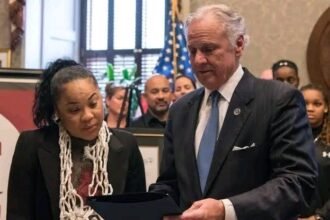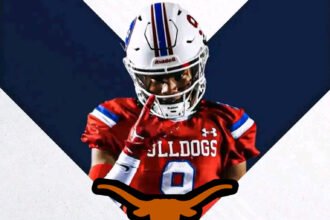Ice Cube, the legendary rapper, actor, and entrepreneur, has long been a vocal supporter of both the Las Vegas Raiders and Shedeur Sanders, the talented quarterback and son of Hall of Famer Deion Sanders. Recently, Ice Cube publicly expressed his desire for the Raiders to draft Shedeur, but he also acknowledged and respected the team’s decision to pass on him. While the Raiders ultimately went in a different direction during the draft, Ice Cube’s perspective offers an interesting look into the intersection of sports, fandom, and the business decisions that shape NFL rosters.
Ice Cube’s connection to the Raiders runs deep. Growing up in South Central Los Angeles, he witnessed the Raiders’ dominance during their time in L.A., and the team’s rebellious, unapologetic identity resonated with him. Even after the franchise moved back to Oakland and eventually to Las Vegas, Ice Cube remained a devoted fan. His passion for the Raiders isn’t just about football—it’s tied to the culture, the history, and the attitude that the team embodies. So when he speaks about the Raiders’ draft choices, his opinions come from a place of genuine investment in the team’s success.
Shedeur Sanders, on the other hand, represents the next generation of football talent. As the starting quarterback at Colorado under his father’s guidance, Shedeur has shown flashes of brilliance, displaying poise, arm talent, and the ability to perform under pressure. His pedigree is undeniable—being the son of one of the greatest athletes of all time certainly comes with high expectations—but Shedeur has worked hard to carve out his own legacy. His performances in college have drawn attention from NFL scouts, and many believe he has the potential to succeed at the professional level.
Given Ice Cube’s love for the Raiders and his admiration for Shedeur’s game, it’s no surprise that he wanted to see the young quarterback in silver and black. The Raiders have had their share of quarterback struggles over the years, and a dynamic player like Shedeur could have brought excitement and potential stability to the position. Ice Cube likely envisioned Shedeur as a franchise cornerstone, someone who could lead the team back to prominence while embodying the Raiders’ swagger.
However, the NFL Draft is never as simple as matching talented players with teams that need them. Numerous factors influence draft decisions—team needs, scheme fits, front office evaluations, and long-term planning all play a role. While Shedeur is undoubtedly talented, the Raiders may have had other priorities or concerns that led them to pass on him. Perhaps they felt another quarterback better fit their system, or maybe they had bigger needs at different positions. The draft is a complex puzzle, and teams must weigh countless variables before making their selections.
Ice Cube’s understanding of why the Raiders passed on Shedeur speaks to his knowledge of the game and the business behind it. He recognizes that NFL teams operate with a bigger picture in mind, and personal preferences—even those of high-profile fans—don’t always align with organizational strategies. Instead of criticizing the decision, Ice Cube showed maturity and respect for the process, acknowledging that the Raiders’ front office has its own vision for building a winning team.
This situation also highlights the unique position of celebrity fans like Ice Cube. Most fans don’t have platforms large enough to publicly voice their draft preferences, but when someone of Ice Cube’s stature speaks, people listen. His endorsement of Shedeur Sanders could bring additional attention to the young quarterback, potentially influencing perceptions among other teams and analysts. At the same time, his measured response to the Raiders’ decision sets an example for how passionate fans can express their opinions without undermining the professionals who make the final calls.
Beyond the Raiders and Shedeur, this scenario reflects broader themes in sports fandom. Fans often develop strong attachments to certain players and dream of seeing them on their favorite teams. Whether it’s a hometown hero, a standout college star, or a player with a compelling story, emotional connections can shape how supporters view roster moves. But at the end of the day, NFL teams must make decisions based on evaluations, analytics, and strategic planning—not just fan sentiment.
For Shedeur Sanders, not being drafted by the Raiders doesn’t diminish his potential. Many great quarterbacks have found success after being overlooked or drafted by different teams than their supporters hoped. The NFL is full of stories of players who exceeded expectations after being passed over by certain franchises. If Shedeur continues to develop and prove himself, he could still have a long and successful career, whether with the team that eventually drafts him or as a standout elsewhere.
As for the Raiders, their decision to pass on Shedeur will be judged in time based on how their chosen players perform. Draft evaluations are always retrospective—fans and analysts won’t know whether it was the right call until seasons unfold. If the players Las Vegas selected contribute to winning football, the choice will be validated. If not, debates about what could have been will inevitably arise. That’s the nature of the draft; every selection carries risk and reward.
Ice Cube’s stance also underscores the relationship between sports and entertainment. As a cultural icon, his opinions bridge the gap between the NFL and the wider world of music, film, and pop culture. His support for Shedeur Sanders isn’t just about X’s and O’s—it’s about recognizing a young athlete’s journey and the narrative surrounding him. In many ways, Ice Cube’s perspective humanizes the draft process, reminding fans that behind every pick is a person with dreams, challenges, and potential.
In the end, Ice Cube’s hope to see Shedeur Sanders as a Raider was a reflection of his passion for the team and his belief in the quarterback’s talent. His understanding of why Las Vegas chose a different path demonstrates a respect for the complexities of NFL decision-making. While the draft didn’t play out as he might have preferred, his perspective adds an interesting layer to the ongoing conversation about team-building, player development, and the ever-evolving landscape of professional football.
The Raiders will move forward with their roster, Shedeur Sanders will continue his journey toward the NFL, and Ice Cube will remain one of the team’s most prominent and passionate supporters. And in the grand scheme of things, that’s what makes sports fandom so compelling—the debates, the dreams, and the unwavering loyalty that keep fans engaged through every draft, every season, and every decision.





